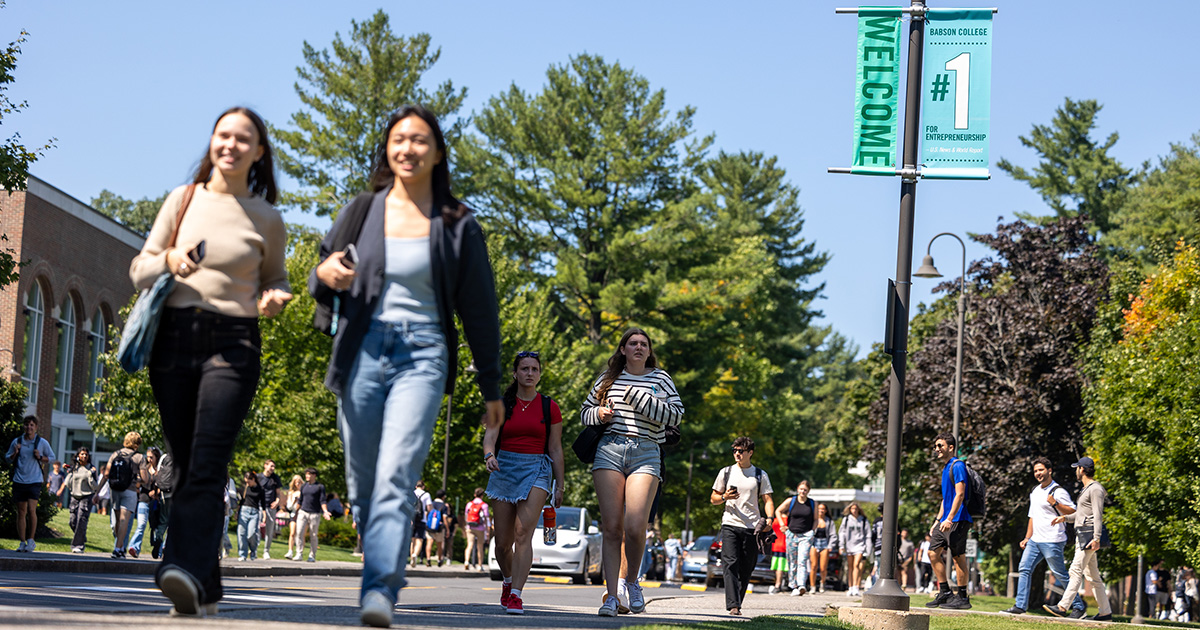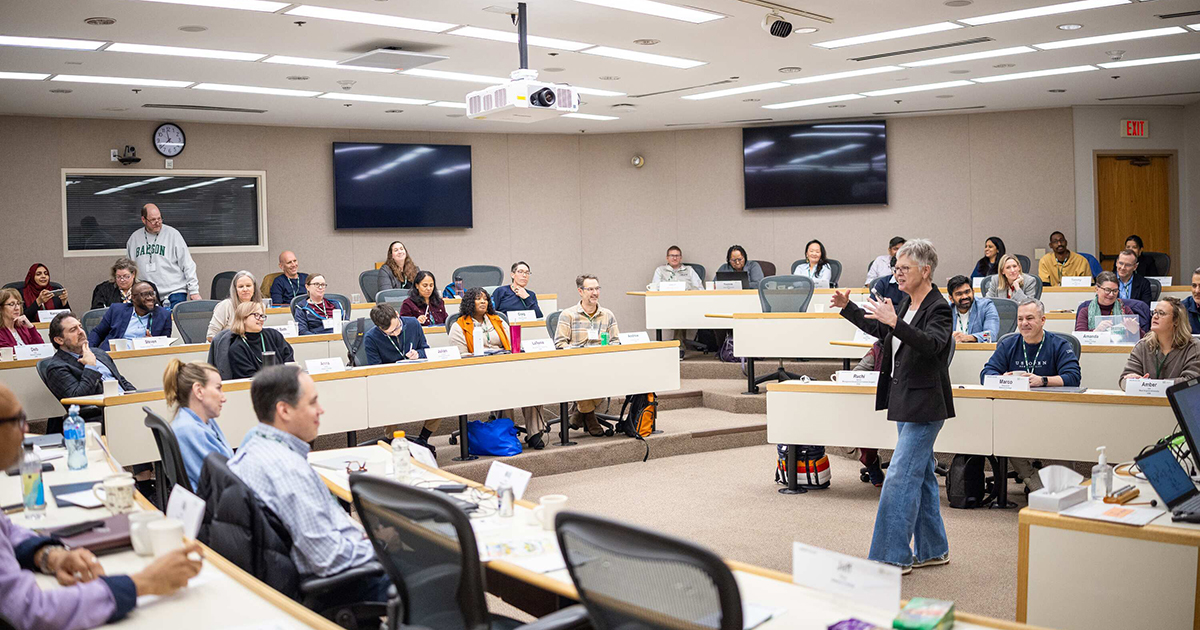‘A Small College with a Global Footprint’
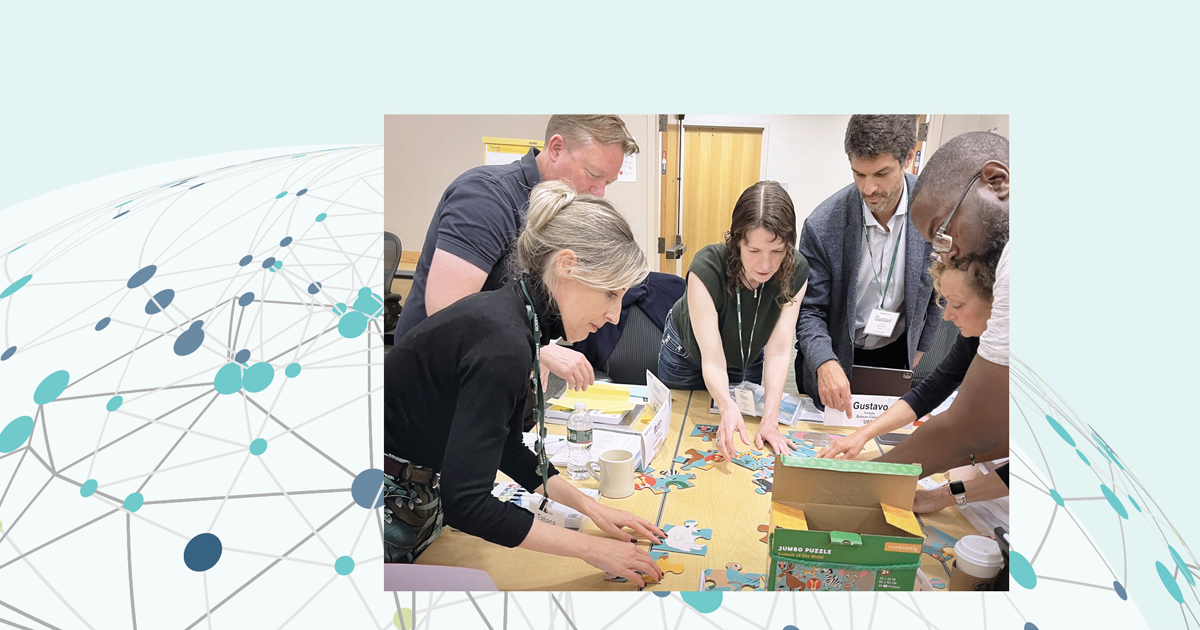
Babson College is renowned for infusing leadership with action. Now, the trademark brand of resilient, adaptable entrepreneurship is taking root globally with the Babson Academy for the Advancement of Global Entrepreneurial Learning.
The Babson Academy’s portfolio of programming provides access, connection, and inspiration in all areas related to Entrepreneurial Thought & Action® (ET&A™) for higher-ed educators, university administrators, non-Babson university students, high school educators, and high school students.
BABSON MAGAZINE: Read the complete Summer 2024 issue.
“We give educators around the world access to how Babson does entrepreneurship education,” Babson Academy Academic Director Heidi Neck says. “We connect to and convene like-minded institutions with a mission to develop and scale entrepreneurship education ecosystems. And we all work together to inspire our most entrepreneurial students to effect positive change on the world through entrepreneurship.”
Last year, the Academy engaged with about 500 educators in 50 countries, with more on the way.
“This is mission-based: Babson wants to take our methodology for teaching entrepreneurship, as the premier leader in entrepreneurship education, worldwide,” Neck says. “We’re a small college with a global footprint that is changing the world through innovative, creative, and extremely experiential entrepreneurship education.”
Taking Action
Babson Academy launched in 2019 and scaled boldly, in true entrepreneurial fashion. To date, the Academy has reached more than 10,000 students and educators in 89 countries. Most recently, the Academy expanded with collaborations in the Middle East and North Africa region, as well as Romania. The effort has introduced thousands of students and entrepreneurship educators from around the world to the Babson mindset, part of the ET&A methodology, in an effort to develop a new style of entrepreneurial leader.
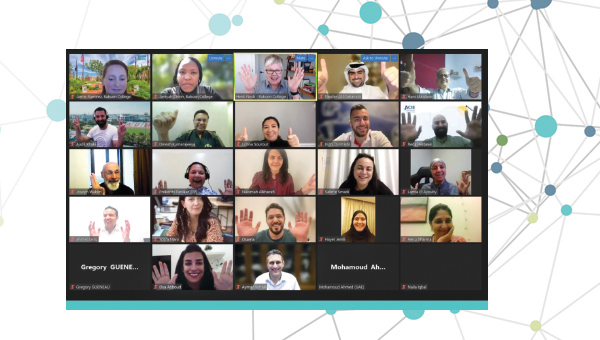
No matter what the setting, the Academy reflects the four universal pillars that define ET&A: Start with what you have, not with what you need. Don’t try to be the best at what you do—be the only. Thirdly, don’t come to Babson to find yourself; come to Babson to create yourself.
But the fourth is the most essential, Neck says.
“Action trumps everything,” says Neck, also the Jeffry A. Timmons Professor of Entrepreneurial Studies at Babson. “We act in order to learn. It’s all about testing, iterating, and experimenting.”
This methodology is galvanizing learners across the globe to see that entrepreneurship is possible, whatever the odds.
“We always have an excuse to not take action: ‘I don’t have the money; I don’t have the resources.’ But Entrepreneurial Thought & Action teaches that you always have something to start with,” Neck says. “An object in motion stays in motion so take one step forward, then another, and then another.”
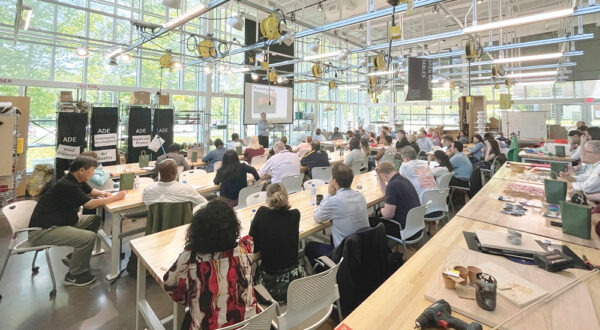
Empowering Educators
Babson Academy is its very own example. A youth-education-oriented program recently launched in Saudi Arabia, with support from the Babson Global Center for Entrepreneurial Leadership. Babson Academy’s Youth Impact Lab trains educators in the K–12 space around the world. The Entrepreneurship Program for Innovators and Changemakers (EPIC) curriculum highlights social entrepreneurship.
Here, Babson trains teachers to enable students to address real-world, local problems in small teams, ranging from education access to poverty solutions. This year, confronted with a lack of visas, Babson pivoted with a virtual course, enrolling educators. A new cohort will begin in fall 2024, this time in person. Approximately seven more schools, with five teachers from each, will attend.
Teachers already have reported significant benefits, says Beth Goldstein, the Youth Impact Lab’s senior director of academic strategy.
“We’re seeing changes for teachers not only in their confidence, which we call self-efficacy in teaching entrepreneurship, but also in their identity as entrepreneurs,” she says. “Our definition of entrepreneurship isn’t ‘I’m going to start a business.’ It’s much more expansive: ‘How do I approach problem-solving?’ Teachers are the quintessential entrepreneurs.”
In particular, teachers report that they have shifted from lecturing to student-centric learning, focusing on ideation, solution identification, and problem solving.
“What really excites me is that students are learning that they can be changemakers, and teachers are embracing this notion of entrepreneurship and entrepreneurial identity, which is incredibly empowering for them because it broadens the scope of how they teach,” Goldstein says. “Their teaching practice becomes much more experiential. They’re more comfortable getting feedback, realizing that the entrepreneurial journey includes failure, and being comfortable taking different risks. That’s entrepreneurial thinking at its finest.”
Prestige and Responsibility
“It’s no secret that for the last 31 years, Babson has been ranked the number-one school in entrepreneurship. This brings both prestige but also responsibility,” says Amir Reza P’28, dean of Babson Academy and Global Education. “We know that entrepreneurial leadership is a way of solving some of the world’s most complex problems. Access, inspiration, and connection are at the heart of our mission.”
In 2023, Babson Academy also expanded its global presence in the Middle East and North Africa region with a Global Symposium for Entrepreneurship Educators (Global SEE) and an MBSC Summer at Babson Program for more than 100 master’s degree students. This expansion represents a commitment to growth through funding from the Babson Global Center for Entrepreneurial Leadership. The connection started through virtual programming for maximum accessibility. Educators were given scholarships to attend entrepreneurial mindset programs led by Babson faculty.
“We know that entrepreneurial leadership is a way of solving some of the world’s most complex problems. Access, inspiration, and connection are at the heart of our mission.”
Amir Reza P’28, dean of Babson Academy and Global Education
Today, 43 universities are part of the Babson Collaborative for Entrepreneurship Education in 31 countries, offering ongoing access to pedagogical best practices and thought leadership from Babson and peer institutions. The growth has an exponential impact, Reza says.
“On the one hand, faculty become better engaged and understand who Babson is and perhaps participate in future programs,” Reza says. “Even more exciting is that each of these faculty members are then in front of at least 100 learners a year going forward. They’re bringing the entrepreneurial mindset that Babson has cultivated into their classrooms and generating future entrepreneur leaders.”
Reza observed the program’s influence in action on a recent trip to the American University of the Middle East in Kuwait. Here, dozens of undergraduate and graduate students participated in the Babson Collaborative Global Student Challenge, where participants ideate business concepts to address U.N. Sustainable Development Goals. The challenge launched in 2018 with 300 students; now, more than 2,600 students from 18 countries participate. Winners compete at the undergraduate and master’s level against Babson Collaborative institutions worldwide.
“I saw the pride that they carry and the responsibility that they see in themselves as future entrepreneurs and problem solvers, not to just make money but also to develop positive impact—and how proud they were that they had a connection with Babson College, even without setting foot on campus,” Reza says.
Creating Opportunities
Meanwhile, Babson Academy continues to build on a relationship with the Romanian-American Foundation in Bucharest in a three-year regional project that will reach 250 faculty and senior administrators. In 2023, the Symposium for Entrepreneurship Educators (SEE Romania) united faculty from 15 institutions for an intensive 3.5-day course on teaching entrepreneurship. And, a three-day Success in Entrepreneurship Ecosystem Development (SEED) program united 39 administrators from seven Romanian universities.

“A strategic priority for Babson is partnership, and this is such an amazing example,” says Nan Covert, Babson Academy senior director of university relations and business development. “Romania has a very traditional university system. That’s important, but you also need players with the entrepreneurship mindset and context who have been empowered by us to be true entrepreneurial leaders, in order to drive the universities forward and continue to create change within the country.”
And no matter where in the world Babson travels, one message is consistent.
“With Babson Academy, the themes of Babson entrepreneurship education are being imparted around the world,” Neck says. “Babson continues to redefine what entrepreneurship is: The ability to identify or create new opportunities under conditions of uncertainty—with the courage to act on them.”
Posted in Community, Entrepreneurial Leadership
